Small World: war games come to family game night
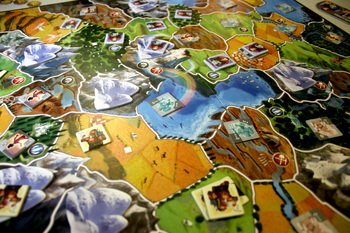
Mike Hulsebus | Contributor
Small World is a strange game. It's a light, area control fantasy war game, but it's also accessible enough that some people play it as a family game.
In Small World, players pick what random race and power pairing they want to lead to victory across Small World. You might pick forest elves or stranger things like flying giants or swamp dwarves. The descriptive powers (forest, flying, swamp) will be matched up randomly with the available races each time, making each game different and adding to replayability, something I really like in a game. Let's take a few turns together so we can see how the game plays.
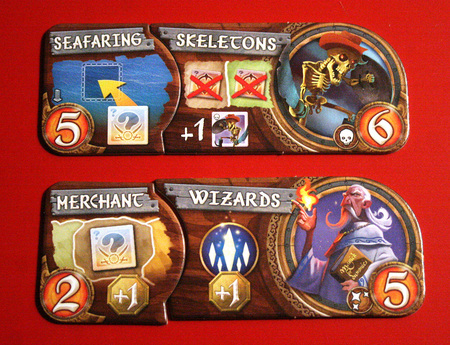
Mike Hulsebus | Contributor
We've picked our starting race and we're going to be the seafaring skeletons and the other player is the merchant wizards. He has already gone ,and now it's our turn to start the game. We add the two corner numbers together and find that we'll be getting 11 skeleton tokens with which to attack. So we take all those up into our hand and get to conquering.
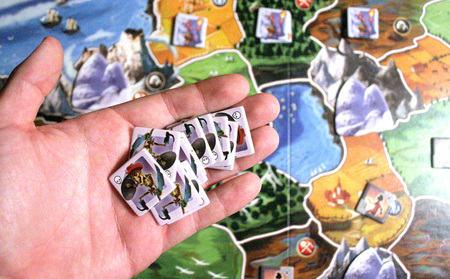
Mike Hulsebus | Contributor
We're seafaring skeletons so, as is listed on our power card, we are the only race that can take sea spaces. Let's start there. To take an empty space, we have to put two guys onto it. Then we continue taking adjacent spaces.
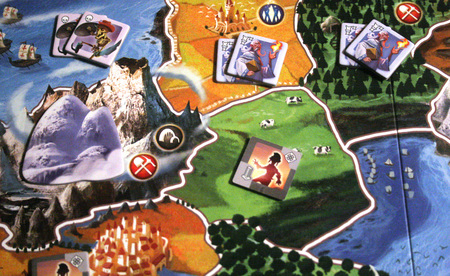
Mike Hulsebus | Contributor
Those wizards next to us, as listed on their race card, get a bonus for being on magic spaces, so let's take that. For locations that aren't empty, we have to put down two guys plus an extra guy there for each piece of cardboard on the space. That wizard space has two wizards on it, so we have to put a total of four guys on that space. One of the wizards dies, and the opponent gets to put one somewhere else.
Moving on to those mountains, mountains are also a piece of cardboard on the board, so we will have to put a total of three guys on that space. For the final space we conquer in a turn, we get to roll a die and get a chance at taking the space, which we succeeded in, knocking the lost tribe out of that space. At the end of our turn, we get a point for each location that we occupy. And, as it so happens, the skeletons also get extra guys to put on the board for each two locations that they conquer, so we'll be able add those to our forces.
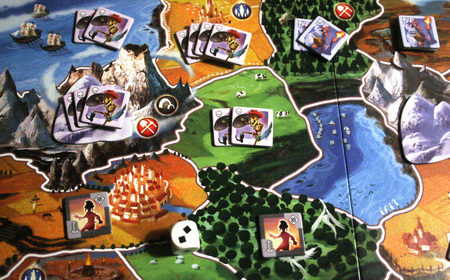
Mike Hulsebus | Contributor
In following turns, we get to pick up our guys (leaving one in each space) and get to send those across the board. What then makes the game great is once we're tired of skeletons — maybe we've spread them all across the map or our enemies have beat us down into dust — we get to put them into decline and pick a new race and see how that works. We still score a limited amount of points for our in decline race, and then also get to add all the points our new guys will get us.
That's by no means a comprehensive look at the rules, but it hopefully does give you enough of a feel for the sort of game that Small World is. Mainly I would like to spend the rest of this review going over the good and bad aspects of the game so you can better determine if this is the game for you.
The game is easy to pick up, but it's going to take at least three games before you feel like you're really fully playing the game. When I played, we spent our first game getting a handle on what the different races did, our second game figuring out that we would be paying attention to how many points the other players were earning, and, finally, by our third game, I felt like I was really starting to play the game at its full potential. That's really neat since it's fun to gradually discover the strategy of a game, but it's unfortunate that for someone's first game you have to give them a big reference sheet that says what all the races and powers do. I recommend just picking a race who you just like for its artwork and learning how that one works rather than looking at the six available races, figuring out what each one does and trying to figure out which will be best.
I love the fact the game comes with four different boards depending on how many players you're playing with to keep the feel of the game as consistent as possible no matter how many people you're playing with. And of course, as mentioned previously, I love that each game is different since the assortment of available races and powers will be different each game.
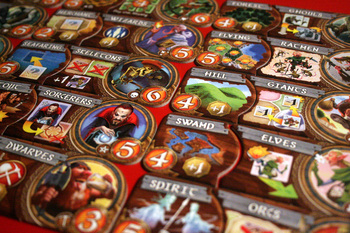
Mike Hulsebus | Contributor
The powers are not balanced: some combos are going to be better choices than others and, in some cases, far better choices. Part of the game is figuring out what races and powers work well together. Rather than present the players with balanced powers, Small World relies on the players to determine what is good and for players to gang up on players that are getting too many points per turn.
Small World, by definition at least, is a war game but it isn't going to feel like a war game. It's going to feel more like you're placing pieces than leading armies across a map. There are no fistfuls of dice to roll. There is, of course, direct conflict, but because of how scoring works, you can have incentive to not attack anyone. For example, I could spend my whole turn trying to take out a few habitated spaces, but usually if there are open spaces, you're going to score more points by spreading your units across those.
Despite what the rest of the Internet suggests, Small World doesn't feel like a family game to me. It's not that it's not a good game, it's that I can't imagine sitting around as a family and vying for territory against one another. Then again, The Dice Tower and all its contributors recently named Small World not only the best family game of 2009 but also the best game 2009, period. So, until we have our baby and she grows up, I'll leave it to people with families to say what's a good family game and what isn't.
I like Small World. I don't think it's across-the-board great enough to call it the best game of 2009, but I think it makes for a good game to pull out every few sessions since every game's combinations will keep the evening's play different. It's not a “main event” kind of game, nor is it a “hey let's get in a quick play of this,” but it's a game that left us saying “that was fun” and left us wanting to play again.
Mike Hulsebus always checks under the table to make sure his cat hasn't conquered and cardboard races of her own. He can be reached at mikehulsebus@gmail.com.

